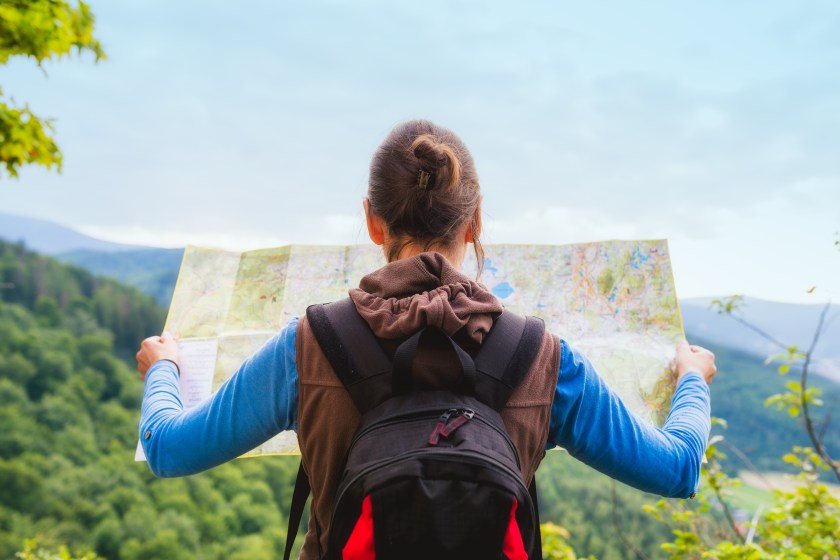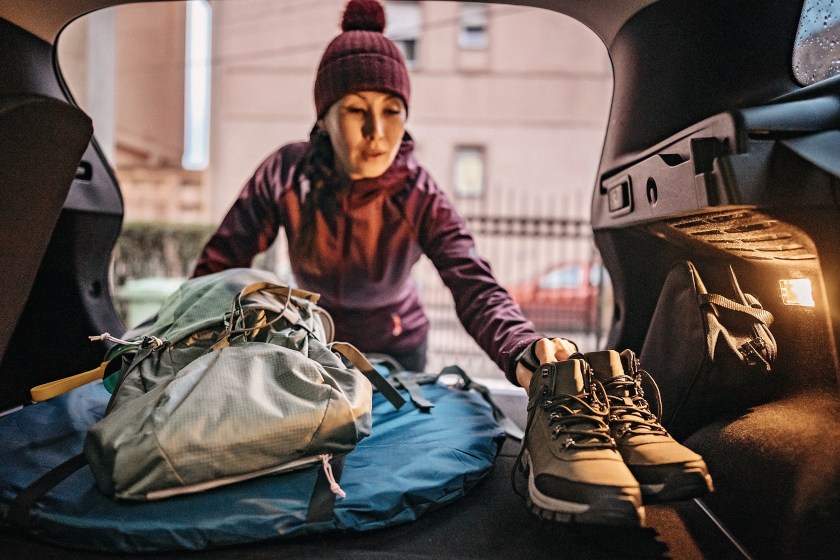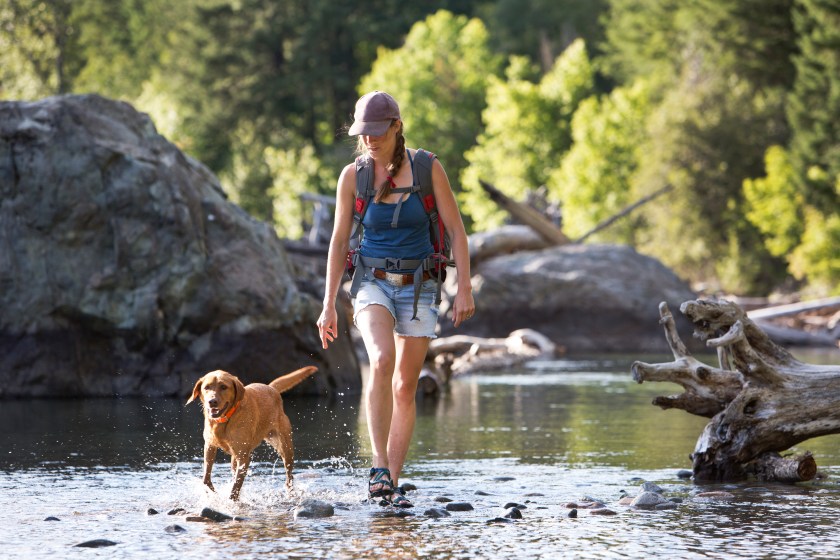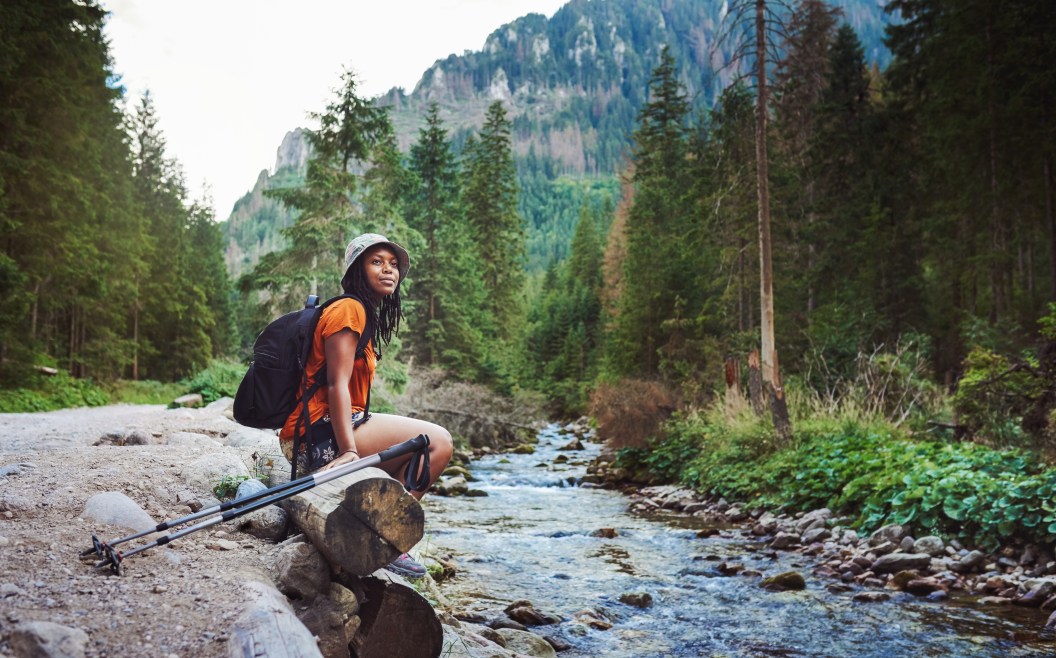Whether you don't have friends who want to go hiking or you just prefer to enjoy nature in true silence, hiking solo can be one of the most liberating and empowering experiences as a woman.
But hiking alone can also be a bit intimidating, particularly if you aren't that experienced of a hiker—or you watch a lot of true crime. And the reality is regardless of your backcountry experience, all women need to take extra precautions to feel safe when alone in the modern world.
However, the right info can go a long way in keeping you prepared, happy, and safe while out hiking solo.
1. Pick Populated Trails—and Stay on Them.
Staying safe is the top consideration when hiking solo, and a big part of that is minimizing physical threats to your safety. Of course, women are fully capable and entitled to hike deep in the backcountry by themselves. But if your goal is to avoid dangerous wildlife and suspicious characters, sticking to popular trails can be reassuring.
You're likely to pass dozens of other hikers along the way, so the noise of chatter is great for deterring predators such as bears, and knowing help will be passing by in case of an emergency provides peace of mind.
Most important is to pick a hike that's on par with your experience and comfort level. Be sure to research routes ahead of time so you're familiar with where you're going. Especially when trails aren't well-marked, download a map or take a GPS with you.
2. Tell Someone Where You're Going.

Getty Images, Santiaga
Before you leave on any solo hike, be sure to tell at least one person exactly where you're going (trail name, trailhead location, and destination) as well as when you plan to be back. In an emergency situation, first responders won't be able to help you if they don't know where to find you.
Check in with your point of contact when you are finished, and make sure they know to contact authorities if you don't arrive or provide an update.
3. Be Prepared to Be Your Own Cheerleader.
As your legs grow weary and breathing becomes more labored, it's easy to doubt whether or not you can make it to the top of the mountain—especially without the encouragement of friends. For an hike, you want to train in advance, which should include strength training and cardio work. But for hiking alone, cultivating mental toughness is really key: Go into each outing anticipating a struggle and always stay positive, even when your calves are burning and blisters are aching.
4. Do Your Research.

Getty Images, Wojciech Kozielczyk
Before you head out on any hike, do your research. Find out what wildlife will be around, what type of terrain you'll be traversing, and what weather conditions will be like when you're there so you can dress accordingly. Remember, you won't have a buddy to share their map, knowledge, or layers if you forget your own. If the forecast is calling for winds that will make summits dangerous, rain that will make slopes slippery, or extreme temperatures that could endanger your health, reschedule your trip.
5. Take a Satellite Phone.
A lot of trails will take you into backcountry where cell service is spotty or obsolete. If you'll be venturing into these off-grid areas, consider investing in a satellite phone that will allow you to touch base with loved ones and share your location when no other means of communication are available.
6. Go Over Your Hiking Checklist Twice.

Getty Images, Pekic
Having all the hiking essentials is crucial on any hike, but often if you didn't pack a windbreaker or a first aid kit someone in your group will have one. Hiking solo, it's crucial to be prepared for all weather and any emergency situation. Make sure you're bringing great-fitting hiking boots, weather-appropriate clothing, and a comfortable hiking day pack.
A packable rain jacket is always great to have in case of unexpected storms. And remember the sunglasses, hat, bug spray, and sunscreen too. (Just make sure you don't weigh your pack down with too many extras.)
7. Bring More Food and Water Than You Think.
Staying nourished, energized, and hydrated on the trail is critical to not only enjoying your day but also for keeping your head clear if you get turned around or feel uncomfortable from another hiker. Pack snacks that offer a good source of protein, carbs, and fat to keep you going on all-day adventures, and make sure you have plenty of water or some type of filtering system when natural sources are available. In fact, we recommend bringing more of both than you think you'll need, just in case.
8. Have a Plan for Self Defense.
Even if you take all the proper precautions, you could end up injured, lost, or stranded. You've already packed a first aid kit and fire starter since those are hiking essentials, but make sure you have a plan for any encounters with dangerous wildlife or other threats. Consider bringing bear spray, which can be used on any kind of predator, as well as a survival knife, a whistle to startle any kind of threat, and any other means of protection based on potential dangers. Bringing your dog along can be another great deterrent for both wildlife and nefarious strangers.
9. Seek Out Good Coverage for Bathroom Stops.
Relieving yourself in the great outdoors when you're hiking alone can feel very vulnerable. Find out if the park or trailhead offers any type of restroom and pack some toilet paper either way. If you have to do your business mid-hike, venture slightly off trail to an area with sufficient cover. If you struggle to squat, consider a female urination device. Bury any waste and pack out used toilet paper in a bag.
10. Stay Aware and Trust Your Gut.

Getty Images, JMichl
Yes, it would be great if you could just go out for a hike and leave all your worries behind. But that's not the world we live in.
While you certainly don't need to spend the entire hike on edge, you should stay aware of your surroundings, keeping an eye and ear out for wildlife and strangers.
Most of all, trust your gut: If it seems like someone may be following you or like stopping in a certain area is too vulnerable, take action to remove yourself from that situation, even if it turns out to be an overreaction.
READ MORE: 5 of Our Favorite Women's Hiking Socks You'll Use All Year Long




